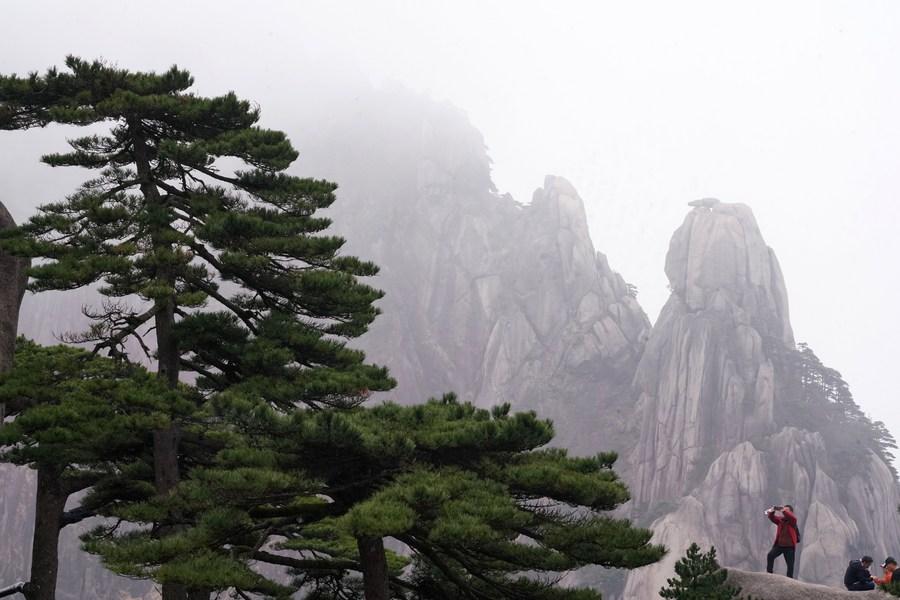
A tourist takes photos of pine trees on Huangshan Mountain in east China's Anhui Province, April 11, 2023. (Xinhua/Ma Ning)
On a delightful early summer day in the enchanting landscapes of Jiulong Peak, nestled in the verdant beauty of east China's Anhui Province, Du Minghui led a group of 20 students on a captivating study tour.
With the harmonious symphony of birdsong echoing through the air, they embarked on the journey, weaving their way through the forest to unlock the secrets and wonders of wildflowers and trees.
"Our tours are primarily centered around nature education, with the aim of allowing children to forge a deep connection with nature and gain a profound understanding of it by sharing knowledge about the animals and plants in the mountains," said the 35-year-old Du.
Du went on to add that the participants in the study tour were mainly primary and secondary school students. Throughout the one-to-two-day tour, the students not only had the opportunity to acquire essential survival skills in the wild, such as knot tying and building basic stretchers but also had the privilege of accompanying the patrollers on their rounds and gaining valuable insight into how to use infrared cameras.
Situated in the southwestern region of the majestic Huangshan Mountain, a renowned UNESCO World Heritage Site in Anhui Province, lies the Jiulong Peak provincial nature reserve. Encompassing an expansive area of 27.2 square kilometers, this sanctuary boasts an impressive forest coverage rate surpassing 97 percent.
Within its lush expanse, nature thrives, sheltering a remarkable array of biodiversity. The reserve is home to 42 rare and protected plant species, as well as 35 national key protected animal species, making it a heaven for ecological conservation and exploration.
In recent years, the reserve has forged extensive partnerships with scientific institutions, capitalizing on its ecological advantages to foster the development of educational tours and ecotourism.
"During the first three days of June, my colleagues and I hosted three groups of students. With the summer vacation approaching, we anticipate an influx of children visiting to experience and appreciate the enchanting beauty of nature," Du said.
The flourishing surge in educational tours is closely linked to the improved environment within the mountains.
Over the years, the reserve has allocated an annual budget of approximately 2 million yuan (about 281,400 U.S. dollars) towards environmental protection, including the establishment of intelligent monitoring platforms across the wilderness and the strategic placement of infrared cameras covering every corner of the reserve.
"With the improving environment, we are delighted to witness the return of numerous animal species that had been absent for years. Just recently, I saw a white-necked long-tailed pheasant, which is a nationally protected animal," Du said.
He explained that over the past four years, the reserve has captured nearly 350,000 images of wild animals. Notably, the camera footage has revealed the resurgence of species such as golden eagles and sika deer that had vanished for an extended period of time. The photos have become an integral part of the study tour, offering an immersive introduction to the diverse wildlife found in the reserve.
Within the picturesque Jiaocun Township at the foot of Jiulong Peak, the lives of many local residents have been transformed through the burgeoning popularity of educational tours and ecotourism. Among them is Cheng Shenggui, a 50-year-old entrepreneur who has found success in the vibrant homestay business.
Sensing the immense potential brought forth by the development of tourism, Cheng returned to his hometown in 2016 and diligently refurbished his abandoned farmhouse, transforming it into a welcoming homestay that attracts tourists from across the country.
"In addition to the participants of the study tours, countless visitors are drawn to Jiulong Peak by its breathtaking beauty and they often stay here for multiple days," Cheng said, adding that during the peak seasons such as holidays, securing a room in his homestay requires reservations made nearly a month in advance. The homestay provides Cheng with a stable annual income exceeding 700,000 yuan.
"In addition to accommodations, our local specialties serve as another source of income," Cheng said. Through collaboration with nearby farmers, he sells honey and other products, leaving the tourists delighted with the region's unique flavors.
Statistics reveal that since 2018, the Jiulong Peak provincial nature reserve has generated over 5 million yuan through the sale of agricultural products and organizing tours.
"We believe that as long as we continue improving and preserving our environment, tourists will eagerly flock to this remarkable destination," Cheng said.